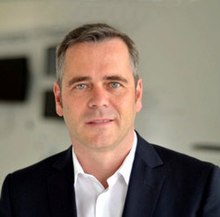Thomas Wiegand | |
|---|---|
 | |
| Born | Thomas Wiegand May 6, 1970 |
| Citizenship | German |
| Alma mater | Hamburg University of Technology, University of Erlangen-Nuremberg |
| Known for | H.264/MPEG-4 AVC video coding standard |
| Awards | Primetime Emmy Engineering Award (2008), Karl Heinz Beckurts Award (2011), IEEE Masaru Ibuka Consumer Electronics Award (2012) |
| Scientific career | |
| Fields | Electrical engineering |
| Institutions | Technische Universität Berlin, Fraunhofer Heinrich Hertz Institute |
Thomas Wiegand (born 6 May 1970 in Wismar) is a German electrical engineer who substantially contributed to the creation of the H.264/AVC, H.265/HEVC, and H.266/VVC video coding standards. For H.264/AVC, Wiegand was one of the chairmen of the Joint Video Team (JVT) standardization committee that created the standard and was the chief editor of the standard itself. He was also a very active technical contributor to the H.264/AVC, H.265/HEVC, and H.266/VVC video coding standards. Wiegand also holds a chairmanship position in the ITU-T VCEG of ITU-T Study Group 16 and previously in ISO/IEC MPEG standardization organizations. In July 2006, video coding work of the ITU-T was jointly led by Gary J. Sullivan and Wiegand for the preceding six years. It was voted as the most influential area of the standardization work of the CCITT and ITU-T in their 50-year history.[1] Since 2018, Wiegand has served as chair of the ITU/WHO Focus Group on Artificial Intelligence for Health (FG-AI4H).[2] Since 2014, Thomson Reuters named Wiegand in their list of “The World’s Most Influential Scientific Minds” as one of the most cited researchers in his field.
- ^ "Video Coding Work Voted Most Influential". ITU-T Newslog. International Telecommunication Union. October 2, 2006. Archived from the original on 30 September 2007. Retrieved 11 April 2012.
- ^ ITU/WHO Focus Group on Artificial Intelligence for Health (FG-AI4H)